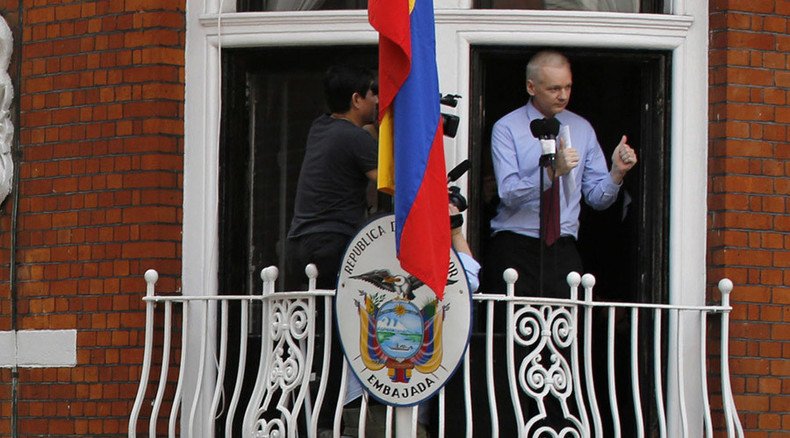Julian Assange: London police take 24-hour guard off Ecuadorian Embassy

Scotland Yard has announced it will end its 24-hour guard of WikiLeaks editor-in-chief Julian Assange at the Ecuadorian Embassy because it is no longer “proportionate.”
The Metropolitan Police will instead deploy “overt and covert tactics” to arrest the Australian citizen.
Police insist they are still committed to arresting Assange under a European Arrest Warrant (EAW) issued in December 2010, which seeks his extradition to Sweden to answer allegations of rape.
Covert plan at Ecuadorian Embassy strengthened after removing dedicated 24/7 guards http://t.co/NyjbqeEi8Vpic.twitter.com/UxTUjhyqcJ
— Metropolitan Police (@metpoliceuk) October 12, 2015The Foreign and Commonwealth Office (FCO) confirmed on Monday it had summoned Ecuadorian Ambassador Carlos Abad Ortiz to “register once again our deep frustration at the protracted delay” in extraditing Assange to Sweden.
The WikiLeaks chief has been living at the Ecuadorian Embassy since June 2012, when he was granted political asylum by the government of Ecuador.
Assange believes if he is deported to Sweden he will faces espionage charges in America over his role in publishing sensitive classified US government documents.
Two out of the four sex crime allegations against him expired in August, leaving one allegation of rape.
Assange has been under 24-hour watch by the Metropolitan Police since he entered the Ecuadorian Embassy, despite having never been charged with a crime.
In June, Scotland Yard admitted the stakeout had cost over £11 million.
The Metropolitan Police announced on Monday it was withdrawing the physical presence of officers outside the embassy on the grounds that it is “no longer proportionate.”
“The operation to arrest Julian Assange does, however, continue and should he leave the Embassy the [Metropolitan police] will make every effort to arrest him,” the service said in a statement.
Scotland Yard said the decision was not “taken lightly” and was discussed with the Home Office and the FCO.
The force said it has to “balance the interest of justice” with the safety of all Londoners.
“Like all public services, [our] resources are finite. With so many different criminal, and other, threats to the city it protects, the current deployment of officers is no longer believed proportionate,” the Met said.
WikiLeaks representative Kristinn Hrafnsson told Sputnik New it is “very hard” to understand what the Met’s new scaled-down surveillance actually means.
Background to today's breaking Assange news: https://t.co/Mb6gXlz7QSpic.twitter.com/aDPCsGeK2Y
— WikiLeaks (@wikileaks) October 12, 2015“It’s a bit hard to read into it. Are they just replacing the visible presence with covert officers? The Metropolitan Police have spent over £12 million on this ridiculous siege for over three years now. So now they’re putting a covert team up against him.
“I wonder if that’s simply a change of tactics and the expenditure will simply go on. It’s very hard to read into exactly what this means. One can speculate that they are possibly trying to hide the cost by removing the visibility of the police officers who have been surrounding the embassy 24/7 since June 19, three years ago.”
Hrafnsson said the move will make little difference to Assange, who remains in de facto incarceration.
“I don’t think I’d call anything a victory unless the siege was called off and Julian is allowed to enjoy the political asylum that he was granted fully in compliance with international law by the Ecuadorian government,” he said.
“So this doesn’t make a huge difference in my mind, it’s obvious that the Metropolitan Police is somewhat reacting to the outrage among the public for spending over £12 million on this ridiculous attempt to arrest him.”
LISTEN MORE:












